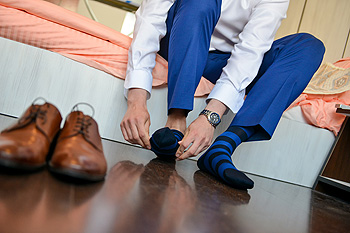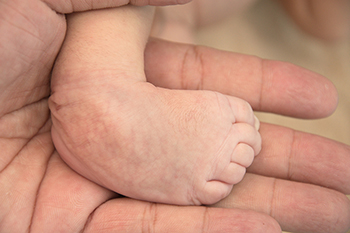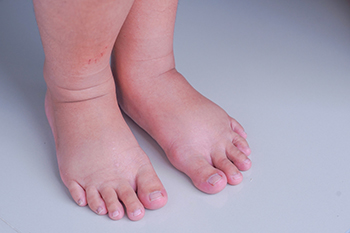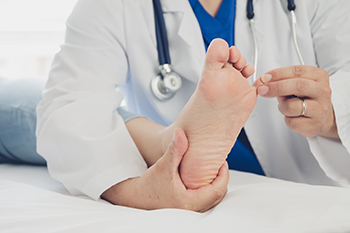Bremerton | Port Orchard (360) 377-2233

Whether you find yourself down to that last clean sock or debating the wisdom of going sockless inside your shoes, it is important to recognize the significance your sock choices can have on foot health. Clean socks play a pivotal role in maintaining foot hygiene, preventing infections, and ensuring overall comfort. Neglecting to change your socks can lead to consequences such as foot odor. This may be caused by the combination of sweat, bacteria, and dead skin cells. While not a direct health problem, dirty socks create an inviting habitat for bacteria and fungi. These can potentially lead to infections, such as athlete's foot or cellulitis. Trapping moisture, sweat, and bacteria against the skin also invites irritation, blisters, rashes, eczema, and dermatitis, all of which can make your feet more susceptible to infections. Re-wearing dirty socks is not recommended, as it can exacerbate foot problems and increase the risk of infections or skin irritations. Wearing the same pair for 24 hours can lead to moisture buildup, bacterial growth, and other potential foot-related issues. If you are dealing with infections, odor, or rashes on your feet, it is suggested that you schedule an appointment with a podiatrist to find the cause and receive treatment.
Everyday foot care is very important to prevent infection and other foot ailments. If you need your feet checked, contact one of our doctors from Kitsap Foot & Ankle Clinic. Our doctors can provide the care you need to keep you pain-free and on your feet.
Everyday Foot Care
Often, people take care of their bodies, face and hair more so than they do for their feet. But the feet are a very important aspect of our bodies, and one that we should pay more attention to. Without our feet, we would not be able to perform most daily tasks.
It is best to check your feet regularly to make sure there are no new bruises or cuts that you may not have noticed before. For dry feet, moisturizer can easily be a remedy and can be applied as often as necessary to the affected areas. Wearing shoes that fit well can also help you maintain good foot health, as well as making it easier to walk and do daily activities without the stress or pain of ill-fitting shoes, high heels, or even flip flops. Wearing clean socks with closed shoes is important to ensure that sweat and bacteria do not accumulate within the shoe. Clean socks help to prevent Athlete’s foot, fungi problems, bad odors, and can absorb sweat.
If you have any questions please feel free to contact one of our offices located in Bremerton and Port Orchard, WA . We offer the newest diagnostic and treatment technologies for all your foot and ankle needs.

Birth defects, also referred to as congenital anomalies, encompass various conditions, among which clubfoot stands out due to its distinctive features. This condition is characterized by the downward and inward turning of the hind foot and ankle, often coupled with forefoot twisting. Understanding the nuances between the two primary types of clubfoot is essential for effective management. Positional clubfoot, arising from fetal positioning, can be addressed through corrective measures such as immobilization in a cast and physical therapy. On the other hand, true clubfoot represents a structural abnormality involving underdeveloped bones or muscles in the leg or foot. This type of deformity necessitates prompt intervention and, in some cases, requires surgical procedures. Beyond these distinctions, there is an association between clubfoot and Larsen syndrome, a more intricate disorder marked by the coexistence of clubfeet and dislocations in the hips, knees, and elbows. With an understanding of the specific club foot type, a podiatrist is able to make informed decisions regarding the most suitable treatment for your child. It is suggested that you schedule an appointment with this type of doctor to discuss treatment options.
Congenital foot problems require immediate attention to avoid future complications. If you have any concerns, contact one of our doctors of Kitsap Foot & Ankle Clinic. Our doctors can provide the care you need to keep you pain-free and on your feet.
Congenital foot problems are deformities affecting the feet, toes, and/or ankles that children are born with. Some of these conditions have a genetic cause while others just happen. Some specific foot ailments that children may be born with include clubfeet, polydactyly/macrodactyly, and cleft foot. There are several other foot anomalies that can occur congenitally. What all of these conditions have in common is that a child may experience difficulty walking or performing everyday activities, as well as trouble finding footwear that fits their foot deformity. Some of these conditions are more serious than others. Consulting with a podiatrist as early as possible will help in properly diagnosing a child’s foot condition while getting the necessary treatment underway.
What are Causes of Congenital Foot Problem?
A congenital foot problem is one that happens to a child at birth. These conditions can be caused by a genetic predisposition, developmental or positional abnormalities during gestation, or with no known cause.
What are Symptoms of Congenital Foot Problems?
Symptoms vary by the congenital condition. Symptoms may consist of the following:
Treatment and Prevention
While there is nothing one can do to prevent congenital foot problems, raising awareness and receiving neonatal screenings are important. Early detection by taking your child to a podiatrist leads to the best outcome possible.
If you have any questions please feel free to contact one of our offices located in Bremerton and Port Orchard, WA . We offer the newest diagnostic tools and technology to treat your foot and ankle needs.

Swollen feet, or edema, a common and often uncomfortable condition, can stem from various factors, each shedding light on the intricate workings of our body. Prolonged periods of standing or sitting, especially in hot weather, can lead to fluid retention, causing feet to swell. Additionally, injuries such as sprains or fractures trigger an inflammatory response, resulting in localized swelling. Conditions like venous insufficiency, where veins struggle to return blood to the heart, contribute to fluid buildup in the lower extremities. Heart, kidney, or liver issues may also manifest in foot swelling as the body retains excess fluids. Pregnancy, hormonal changes, and certain medications can further exacerbate this phenomenon. If your feet have become swollen, it is suggested that you confer with a podiatrist who can determine what the cause is, and offer tips for relief.
Swollen feet can be a sign of an underlying condition. If you have any concerns, contact one of our doctors of Kitsap Foot & Ankle Clinic. Our doctors can provide the care you need to keep you pain-free and on your feet.
Swollen feet are a common ailment among pregnant women and people who stand or sit for extended periods. Aging may increase the possibility of swollen feet and patients who are obese often notice when their feet are swelling too. There may be medical reasons why swollen feet occur:
Swollen feet can also be caused by bone and tendon conditions, including fractures, arthritis, and tendinitis. Additionally, there may be skin and toenail conditions and an infection may cause the feet to swell. Patients who take medicine to treat high blood pressure may be prone to getting swollen feet.
Many patients elevate their feet to help relieve the swelling and this is generally a temporary remedy. When a podiatrist is consulted the reason behind the swelling can be uncovered and subsequently treated.
If you have any questions please feel free to contact one of our offices located in Bremerton and Port Orchard, WA . We offer the newest diagnostic tools and technology to treat your foot and ankle needs.

The third trimester of pregnancy often introduces new challenges for expectant mothers, including foot pain. As the baby grows, the added weight places increased pressure on the feet, leading to discomfort and swelling. Hormonal changes further contribute to the relaxation of ligaments, altering the foot's arch and potentially causing pain. Edema, or fluid retention, is a common occurrence in late pregnancy, leading to swollen feet and ankles. The body's increased blood volume and the pressure exerted by the growing uterus on blood vessels can also affect circulation to the lower extremities. Prioritizing comfortable footwear, elevating the feet when possible, and engaging in gentle stretches can provide relief. If you have foot pain during your pregnancy, it is suggested that you consult a podiatrist who can monitor your foot health.
Pregnant women with swollen feet can be treated with a variety of different methods that are readily available. For more information about other cures for swollen feet during pregnancy, consult with one of our doctors from Kitsap Foot & Ankle Clinic. Our doctors will attend to all of your foot and ankle needs.
What Foot Problems Can Arise During Pregnancy?
One problem that can occur is overpronation, which occurs when the arch of the foot flattens and tends to roll inward. This can cause pain and discomfort in your heels while you’re walking or even just standing up, trying to support your baby.
Another problem is edema, or swelling in the extremities. This often affects the feet during pregnancy but tends to occur in the later stages.
How Can I Keep My Feet Healthy During Pregnancy?
If you have any questions please feel free to contact one of our offices located in Bremerton and Port Orchard, WA . We offer the newest diagnostic and treatment technologies for all your foot and ankle needs.

Podiatrists are specialized healthcare professionals who focus on the diagnosis, treatment, and prevention of foot and ankle disorders. There are various compelling reasons to schedule a visit to a podiatrist. First, persistent foot or ankle pain should not be ignored, as it can be an indicator of an underlying issue. Podiatrists are experts in identifying and addressing the source of your discomfort. They can diagnose conditions such as plantar fasciitis, bunions, or heel spurs, and develop personalized treatment plans. If you are experiencing mobility issues, a podiatrist can help. They can provide custom orthotics or recommend appropriate footwear to improve your gait and balance. Diabetes can take a toll on the feet, leading to complications like neuropathy and ulcers. Regular check-ups with a podiatrist are essential for early detection and preventative care. In short, consulting a podiatrist is beneficial for anyone seeking to maintain their overall foot health, in addition to alleviating foot pain. It is suggested that you visit a podiatrist if you are interested in learning more about the field of podiatry.
If you are experiencing pain in the feet or ankles, don’t join the stubborn majority refusing treatment. Feel free to contact one of our doctors from Kitsap Foot & Ankle Clinic. Our doctors can provide the care you need to keep you pain-free and on your feet.
What Is a Podiatrist?
Someone would seek the care of a podiatrist if they have suffered a foot injury or have common foot ailments such as heal spurs, bunions, arch problems, deformities, ingrown toenails, corns, foot and ankle problems, etc.
Podiatric Treatment
A podiatrist will treat the problematic areas of the feet, ankle or lower leg by prescribing the following:
A common podiatric procedure a podiatrist will use is a scanner or force plate which will allow the podiatrist to know the designs of orthotics. Patients are then told to follow a series of tasks to complete the treatment. The computer will scan the foot a see which areas show weight distribution and pressure points. The podiatrist will read the analysis and then determine which treatment plans are available.
If you have any questions please feel free to contact one of our offices located in Bremerton and Port Orchard, WA . We offer the newest diagnostic and treatment technologies for all your foot and ankle needs.